hydration and injury prevention - The important Role hydration plays
December 18th, 2019 | 5 min. read
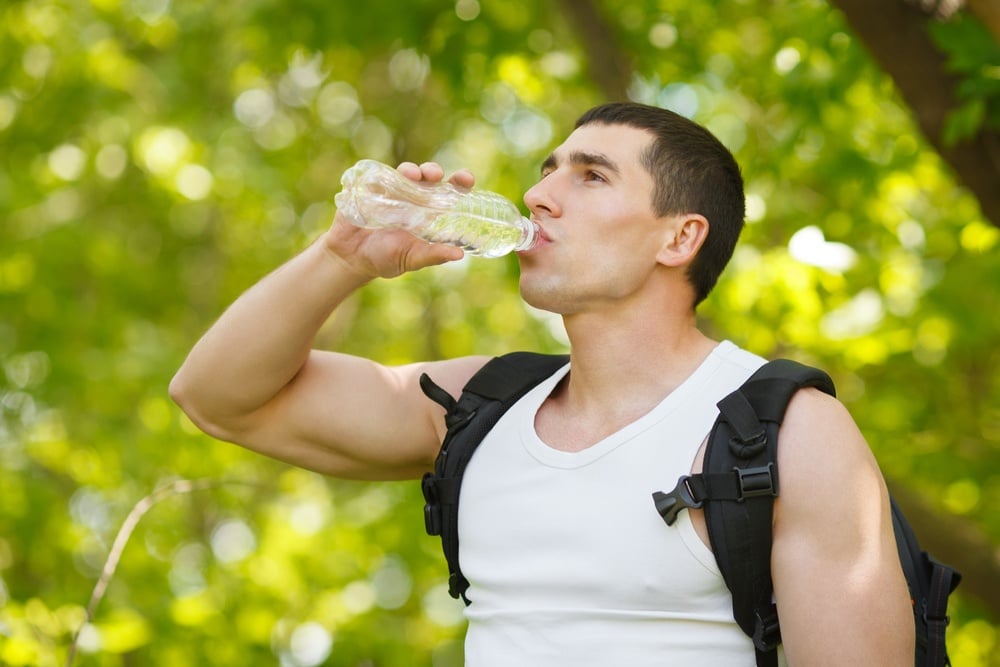
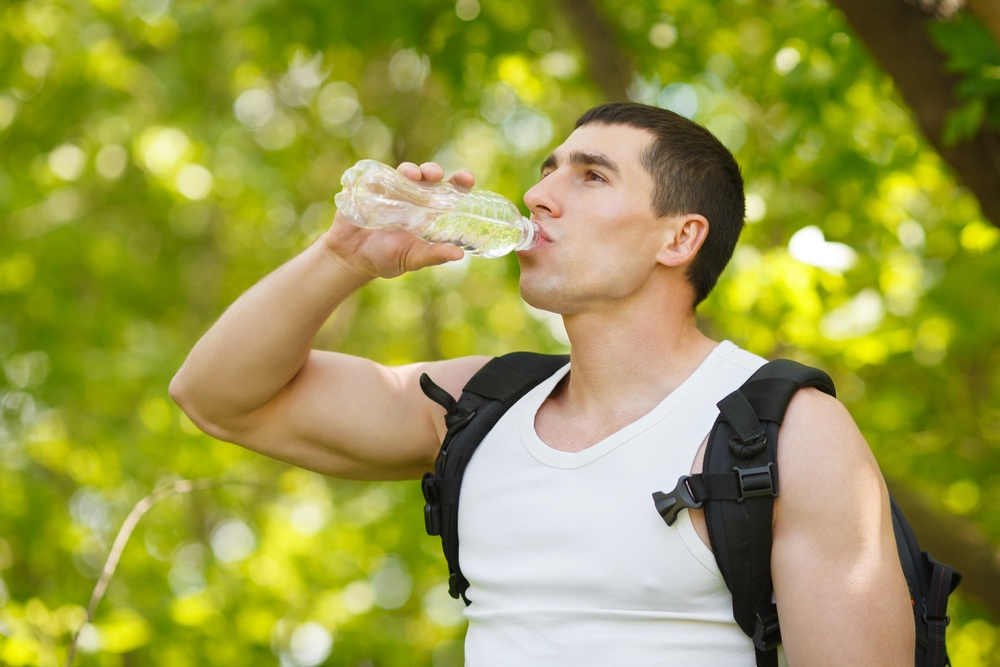
Most of us realize the importance of hydration to exercise. Drinking water before, during, and after workouts regulates your body temperature, delivers nutrients and oxygen to your cells, and removes waste. But did you know that proper hydration is also an important part of preventing injuries?
You may already be familiar with some of the often cited reasons why hydration is important to maintaining your health. Drinking water has many benefits.
THE BENEFITS OF HYDRATION
Hydrating during exercise is not optional; water is a nutrient necessary to survival. A fully hydrated body is about 50–65% water (the rest is muscle, bone, organs, and fat).
Even losing just 1% of your body's water content to sweat when you work out can put you at risk for illness and injury, particularly in hot or humid weather (see below, "Hydrate to Avoid Injury").
Over the long term, not drinking enough water on a daily basis can have multiple negative effects on your health.
Keeping a proper fluid balance in your body:
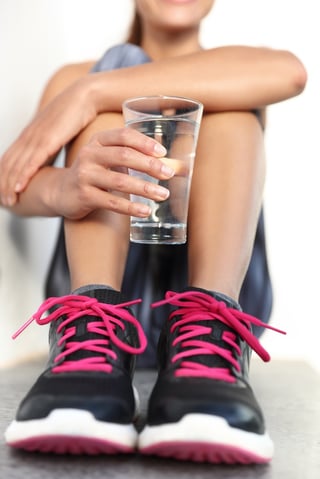
- improves circulation
- regulates body temperature
- helps control cholesterol levels
- improves brain function
- supplies nutrients and oxygen to your cells
- flushes the kidneys, bladder, and gut of toxins and bacteria
- promotes proper digestion and absorption of nutrients
- moisturizes the skin and mucous membranes
- aids weight management and can contribute to weight loss
Under-hydrating can throw all of those systems off balance, which can lead to problems with your heart, your digestion, your nervous system, and your endocrine system.
DEHYDRATION SYMPTOMS AND SIDE EFFECTS
How will you know if you're dehydrated? The first symptom is thirst. If you're thirsty, you're already dehydrated.
Symptoms of dehydration include:
- Dryness of the lips, mouth, or tongue
- Reduced energy or apathy
- Decreased or Infrequent urination with small volume of urine or dark urine
- A sudden decline in mood, strength, coordination, or the ability to make decisions
Many people don't realize that hydration affects the musculoskeletal system, as well.
How Dehydration Affects Your Muscles and Joints
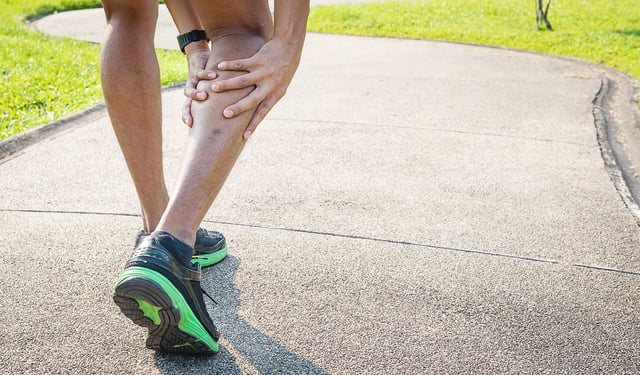
- Cramps. Your body needs both water and electrolytes (sodium, potassium, magnesium, calcium, and chloride) to support normal muscle contractions. When you sweat heavily during workouts, you lose both, causing cramps.
- Cartilage wear. Water and electrolytes are essential to delivering nutrients that help cartilage repair itself when it's injured. If you stop drinking water, the wear and tear on your cartilage (especially your knees) outpaces the body's ability to generate new cells. Injuries like cartilage tears and meniscus tears can result.
- Friction in the joints. Cartilage is made of collagen, proteins, cells, synovial fluid, and water — up to 80% water. This water and synovial fluid cushions your bones when they bear weight or pressure. The meniscus, for example, pads your knee joint and allows the leg bones to move smoothly past one another without grinding. Dehydration can deprive your cartilage of the water it needs to maintain this cushion, which can lead to achy or "creaking" joints and osteoarthritis (OA).
We all need to stay hydrated to stay healthy. But if you're active or athletic, hydration is even more important because you're losing water to sweat. If you hope to avoid injury, replacing water and electrolytes needs to be a pillar of your sports training routine.
HOW TO HYDRATE TO AVOID INJURY
The importance of hydration for athletes and runners (especially marathon and road race runners) cannot be overstated: if you're exercising rigorously or playing sports, especially in a hot or humid climate like Corpus Christi, you need to drink enough water to keep your body functioning.
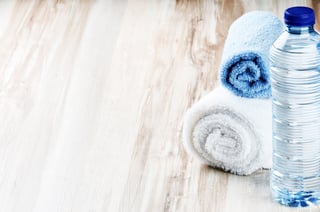
Failing to stay hydrated can hinder your sports performance. Even losing just 1% of your body's water content to sweat and dehydration can make you less effective as an athlete.
You may experience headaches, mental confusion, and fatigue.
Making fast decisions gets harder when you're dehydrated, too, and that can put you in harm's way.
(Example: if you're not thinking clearly, it may be hard to dodge a football tackle or jump over an obstacle during a road race.)
Your biggest danger from dehydration, however, is heat illness.
Dehydration — especially in hot weather — puts you at risk for serious harm from an acute heat injury. If you don't replace the water and salt you lose through sweat, your body cannot regulate its temperature, which can lead to:
- Heat cramps in the stomach, arms, or legs.
- Syncope, characterized by fatigue, weakness, and fainting. This condition is caused by overexerting yourself in hot weather. Syncope can become serious and turn into heat stroke if left untreated.
- Heat exhaustion, which can lead to a sudden increase in core body temperature, up to 104 degrees. Heat exhaustion happens when you lose too much water or salt (or both). You may stop perspiring and experience thirst, headaches, dizziness, weakness, nausea and vomiting, muscle cramps, or even unconsciousness.
- Heat stroke. Heat stroke is severe and constitutes a medical emergency. The body can no longer cool itself, which can lead to core body temperatures exceeding 104 degrees. Heat stroke can cause nausea, seizures, confusion or disorientation, unconsciousness, and at its most serious, organ failure and coma. It does not always present with clear symptoms, but it can be preceded by syncope or heat exhaustion. Heat stroke can be life-threatening. If you or someone around you shows signs of heat stroke, call 911.
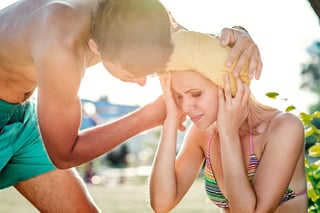
If you experience any of the above symptoms, take immediate action to cool your body:
- Stop exercising.
- Get out of the heat.
- Stretch gently (if you have cramping).
- Replace your fluids right away with an electrolyte drink or water.
- Loosen your clothing if possible.
- Apply cool packs or wet towels to lower your body temperature.
If you are exercising 60 to 90 minutes or longer in hot weather, drink fluids throughout your workout and pay careful attention to your body. Prevention can save your life.
Recommended daily water intake
The recommended daily water intake for a teenager or adult is eight 8-ounce glasses of water per day.
To maintain a proper fluid balance when exercising, you'll need to drink more fluids than usual to replenish what you lose through sweat. Be prepared with a water bottle or sports drink. Hydrate before, during, and after your workout.
Guidelines for hydration when exercising
- Before workout: Drink 20 ounces within two hours of exercising.
- During workout: Drink 4–8 ounces every 15–20 minutes.
- After workout: To replace water you've lost through sweat, drink about 24 ounces for every pound of body weight you've lost through sweat. (If you can, weigh yourself before your workout and immediately after.)
HYDRATING DRINKS
The best drink for avoiding dehydration is water. Water is a sugar-free, calorie-free nutrient and is optimal for good health.
However, sports drinks can be useful if you've lost a lot of fluid and salt quickly (for example, running or playing sports for long periods in high heat and humidity). Keep in mind, electrolyte sports drinks contain sugar and sodium. For regular daily hydration, pure water is a healthier choice.
If you don't like the taste of tap or bottled water, you can make your own "spa water" at home by adding lemon, cucumber, or mint for flavor. You can also flavor water with slices of fresh fruit like apples, orange, or grapefruit.
Coconut water is another option. It is rich in electrolytes and less sugary than sports drinks, but it does contain calories.
Tap, cold, or hot water are all fine, as long as you are meeting your daily requirements.
HYDRATION AND THE ELDERLY

Staying hydrated isn't just for athletes and young, active people.
Older people are particularly vulnerable to dehydration. Medications like diuretics remove water from the body, leading to faster dehydration.
However, living alone or entering a care facility can cause people to forget to drink enough fluids. Various physical or cognitive health issues can also lead to a reduced water intake.
No matter what your age, even if you are not thirsty, make sure you're drinking enough water to maintain good health per the guidelines listed above.
If you have an elderly person in your life who isn't drinking enough water, make arrangements to have his or her fluid intake monitored.
Remember: eight 8-ounce glasses per day can make a big difference in maintaining health and preventing injury.
Stay healthy this summer
If you're an adult athlete, a student athlete, a runner, or have a history of injury, give Coastal Orthopedics a call. Our orthopedic specialists can assess your physical condition, talk to you about sports medicine options, and help you stay active safely.
Article written by: Rob Williams, MD
Dr. Williams has been practicing orthopedic surgery in Corpus Christi since 1998. After graduating from Texas Tech hereceived his medical degree from the University of Texas at San Antonio. At the prestigious Campbell Clinic located at the University of Tennessee, Dr. Williams completed not only an Orthopedic Surgery Residency, but an additional year of Fellowship Training in Spine Surgery. Dr. Williams is dedicated to creating an excellent patient experience in the office or in the surgery suite.
Topics:

